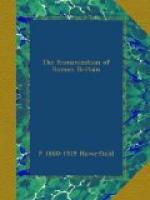Such is the historical situation to which we must adjust our views of any single province in the western Empire. Two main conclusions may here be emphasized. First, Romanization in general extinguished the distinction between Roman and provincial, alike in politics, in material culture, and in language. Secondly, it did not everywhere and at once destroy all traces of tribal or national sentiments or fashions. These remained, at least for a while and in a few districts, not so much in active opposition as in latent persistence, capable of resurrection under the proper conditions. In such cases the provincial had become a Roman. But he could still undergo an atavistic reversion to the ancient ways of his forefathers.
CHAPTER II
PRELIMINARY REMARKS ON ROMAN BRITAIN
One western province seems to form an exception to the general rule. In Britain, as it is described by the majority of English writers, we have a province in which Roman and native were as distinct as modern Englishman and Indian, and ‘the departure of the Romans’ in the fifth century left the Britons almost as Celtic as their coming had found them. The adoption of this view may be set down, I think, to various reasons which have, in themselves, little to do with the subject. The older archaeologists, familiar with the early wars narrated by Caesar and Tacitus, pictured the whole history of the island as consisting of such struggles. Later writers have been influenced by the analogies of English rule in India. Still more recently, the revival of Welsh national sentiment has inspired a hope, which has become a belief, that the Roman conquest was an episode, after which an unaltered Celticism resumed its interrupted supremacy. These considerations have, plainly enough, very little value as history, and the view which is based on them seems to me in large part mistaken. As I have pointed out, it is not the view which is suggested by a consideration of the general character of the western provinces. Nor do I think that it is the view which agrees best with the special evidence which we possess in respect of Britain. In the following paragraphs I propose to examine this evidence. I shall adopt an archaeological rather than a legal or a philological standpoint. The legal and philological arguments have often been put forward. But the legal arguments are entirely a priori, and they have led different scholars to very different conclusions. The philological arguments are no less beset with difficulties. Both the facts and their significance are obscure, and the inquiry into them has hitherto yielded little beyond confident and yet wholly contradictory assertions and theories which are not susceptible of proof. The archaeological evidence, on the other hand, is definite and consistent, and perhaps deserves fuller notice than it has yet received. It illuminates, not only the material civilization, but also the language and to some extent even the institutions of Roman Britain, and supplies, though imperfectly, the facts which our legal and philological arguments do not yield.




